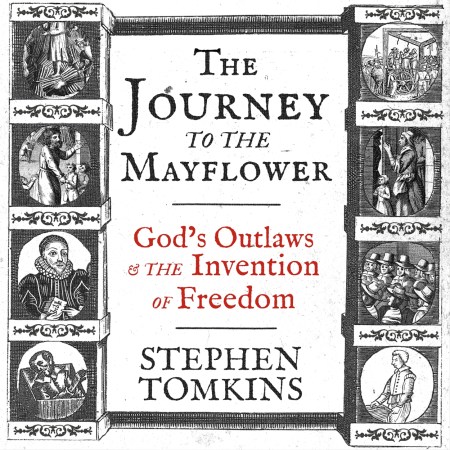The Journey to the Mayflower
On sale
23rd January 2020
Price: £21.99
2020 sees the 400th anniversary of the sailing of the Mayflower – the ship that took the Pilgrim Fathers to the New World. It’s a foundational event in American history, but it began as an English story, which pioneered the idea of religious freedom.
The illegal underground movement of Protestant separatists from Elizabeth I’s Church of England is a story of subterfuge and danger, arrests and interrogations, prison and executions. It starts with Queen Mary’s attempts to burn Protestantism out of England, which created a Protestant underground. Later, when Elizabeth’s Protestant reformation didn’t go far enough, radicals recreated that underground, meeting illegally throughout England, facing prison and death for their crimes. They went into exile in the Netherlands, where they lived in poverty – and finally the New World.
Stephen Tomkins tells this fascinating story – one that is rarely told as an important piece of English, as well as American, history – that is full of contemporary relevance: religious violence, the threat to national security, freedom of religion and tolerance of dangerous opinions.
This is a must-read book for anyone interested in the untold story of how the Mayflower came to be launched.
(P) 2020 Hodder & Stoughton Ltd
The illegal underground movement of Protestant separatists from Elizabeth I’s Church of England is a story of subterfuge and danger, arrests and interrogations, prison and executions. It starts with Queen Mary’s attempts to burn Protestantism out of England, which created a Protestant underground. Later, when Elizabeth’s Protestant reformation didn’t go far enough, radicals recreated that underground, meeting illegally throughout England, facing prison and death for their crimes. They went into exile in the Netherlands, where they lived in poverty – and finally the New World.
Stephen Tomkins tells this fascinating story – one that is rarely told as an important piece of English, as well as American, history – that is full of contemporary relevance: religious violence, the threat to national security, freedom of religion and tolerance of dangerous opinions.
This is a must-read book for anyone interested in the untold story of how the Mayflower came to be launched.
(P) 2020 Hodder & Stoughton Ltd
Newsletter Signup
By clicking ‘Sign Up,’ I acknowledge that I have read and agree to Hachette Book Group’s Privacy Policy and Terms of Use
Reviews
This is a rattling good read. Stephen Tomkins conveys the sweep of Reformation history through the hair-raising, sometimes hilarious and often tragic stories of the men and women who suffered or survived it. There's a startling sense of déjà vu as the reader is confronted with the dedication and vehemence of those who pursued their dream of
a perfect church.
The Journey to the Mayflower is a riveting story; it is impeccably researched history but more than this, it is an account that allows us to trace the essential elements of western democracy and liberalism to the key struggle for religious freedom. Stephen Tomkins's work reminds us that individual liberty as we understand it today would not
have been possible without the experience of those who fought for their freedom to believe. Well written, engaging and entertaining, this book serves as a reminder of the importance of upholding religious freedom in our current age.
Here is a gripping and informed account of the people and pressures that launched the Mayflower. Stephen Tomkins is a capable historian, but never dull, and a respectful yet critical friend of the early puritans. This is an important chapter in England's Christian story, and America's too, very well told.
As a Mayflower descendant and a religious leader committed to a fervent faith that seeks new pathways to old truths, I find this book enlightening and delightful. It tells the story of those whose courage rekindled a faith made stale by practices and doctrines more material than spiritual: a reminder that we are always reforming, always keeping pace with a Holy Spirit whose work it is to rescue the Church from its inhibiting complacency and misplaced ambition.
It is an informative and lively account, based on thorough research
vivid, fast-paced prose . . . At the heart of Tomkins's book is the thought that the arguments these puritans developed against the imposition of idolatry and superstition upon themselves would soon become broader arguments for the
possibility of dissent, for liberty and religious choice.
Puritanism was not a pretext for the 'reformation of manners': it was a spiritual epiphany.

